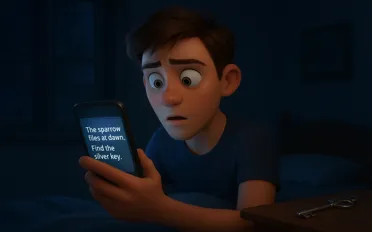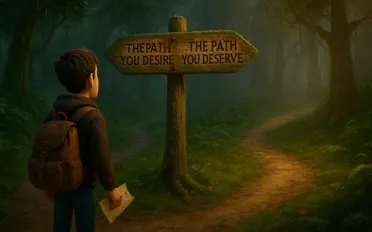The Professor’s Unexpected Question
برای شنیدن صدا روی نوار پخش زیر کلیک کنید
It was a rainy Monday morning, and the lecture hall buzzed with sleepy murmurs as students waited for Professor Alden’s notorious Philosophy of Thought class to begin. Known for his eccentric teaching style and cryptic assignments, the professor was both feared and admired. Nobody ever quite knew what to expect from him.
When he finally entered, his soaked trench coat dripping onto the floor, the room fell silent. Without saying a word, he walked to the board, picked up a piece of chalk, and wrote a single question in large, deliberate letters:
What would you do if you discovered your thoughts weren’t your own?
The students stared. No one dared to speak. Then, with a faint smile, the professor sat on his desk and said, “You have ten minutes. Begin.”
Sophie, sitting in the second row, felt a chill crawl up her spine. She had always admired the professor’s intellect, but something in his voice sounded different—urgent, almost frightened. She began to write, her pen trembling slightly: If my thoughts aren’t mine, then who is thinking them for me?
One by one, students filled their papers with philosophical ramblings, existential panic, and wild theories. Ten minutes later, the professor collected the essays, glanced at them briefly, and asked, “How many of you felt something unusual while writing?”
More than half the class raised their hands. Sophie’s heart pounded.
“Good,” he said quietly. “Now listen carefully. What you experienced wasn’t imagination—it was real. For the past semester, I’ve been running a small experiment with a thought-suggestion algorithm. Every student here has been receiving subtle mental prompts through the university’s neuro-learning headsets.”
A stunned silence swept through the hall.
He paused, looking at their pale faces. “The experiment’s goal was simple: to test how easily human free will could be influenced.”
Then, his tone softened. “But here’s the twist—there was no algorithm. I lied. Everything you felt came from your own mind. You chose to believe in control.”
As the class erupted in whispers, Sophie realized the true lesson: the most dangerous manipulation isn’t external—it’s the one we allow ourselves to imagine.
And from that day, no one in Professor Alden’s class ever trusted their own thoughts quite the same way again.
ترجمه فارسی
صبح دوشنبهی بارانی بود، و سالن سخنرانی پر از زمزمههای خوابآلود دانشجویانی بود که منتظر شروع کلاس بدنام «فلسفه تفکر» پروفسور آلدن بودند. این پروفسور که به سبک تدریس عجیب و غریب و تکالیف مبهمش معروف بود، هم مورد ترس و هم مورد تحسین بود. هیچکس هرگز دقیقاً نمیدانست چه انتظاری از او داشته باشد.
وقتی بالاخره وارد شد، در حالی که آب از بارانی خیسش روی زمین میچکید، اتاق ساکت شد. بدون اینکه کلمهای بگوید، به سمت تخته رفت، گچی برداشت و یک سوال واحد را با حروف درشت و سنجیده نوشت:
اگر بفهمید افکارتان مال خودتان نیست، چه میکنید؟
دانشجویان خیره ماندند. هیچکس جرئت حرف زدن نداشت. سپس، پروفسور با لبخندی محو، روی میزش نشست و گفت: «ده دقیقه وقت دارید. شروع کنید.»
سوفی، که در ردیف دوم نشسته بود، لرزی را در ستون فقراتش حس کرد. او همیشه هوش پروفسور را تحسین میکرد، اما چیزی در صدایش متفاوت به نظر میرسید – فوری، تقریباً ترسیده. او شروع به نوشتن کرد، در حالی که خودکارش کمی میلرزید: اگر افکار من مال من نیستند، پس چه کسی آنها را برای من فکر میکند؟
دانشجویان یکییکی برگههای خود را با پرتوپلاهای فلسفی، وحشت اگزیستانسیال و نظریههای عجیب پر کردند. ده دقیقه بعد، پروفسور مقالهها را جمع کرد، نگاهی کوتاه به آنها انداخت و پرسید: «چند نفر از شما هنگام نوشتن احساس غیرعادی داشتید؟»
بیش از نیمی از کلاس دستان خود را بالا بردند. قلب سوفی به شدت میتپید.
او به آرامی گفت: «خوب است. حالا با دقت گوش کنید. چیزی که تجربه کردید تخیل نبود – واقعی بود. در طول ترم گذشته، من در حال اجرای یک آزمایش کوچک با یک الگوریتم پیشنهاد فکر بودم. هر دانشجویی در اینجا از طریق هدستهای یادگیری عصبی دانشگاه، پیامهای ذهنی ظریفی دریافت میکرده است.»
سکوتی حیرتزده سالن را فرا گرفت.
او مکثی کرد و به چهرههای رنگپریده آنها نگریست. «هدف آزمایش ساده بود: آزمایش اینکه اراده آزاد انسان چقدر راحت میتواند تحت تأثیر قرار گیرد.»
سپس، لحنش ملایم شد. «اما نکته انحرافی اینجاست – هیچ الگوریتمی وجود نداشت. من دروغ گفتم. هر چیزی که احساس کردید از ذهن خودتان بود. شما انتخاب کردید که به وجود کنترل باور داشته باشید.»
در حالی که کلاس غرق در پچپچ شد، سوفی درس واقعی را فهمید: خطرناکترین دستکاری، بیرونی نیست – بلکه آنی است که ما به خودمان اجازه میدهیم تصورش کنیم.
و از آن روز به بعد، هیچکس در کلاس پروفسور آلدن دیگر هرگز به افکار خود به همان شکل سابق اعتماد نکرد.
واژگان (Vocabulary 📚)
| Words | معنی |
|---|---|
| Philosophy | فلسفه |
| Eccentric | عجیب و غریب / نامتعارف |
| Cryptic | مرموز / مبهم |
| Thoughts | افکار |
| Existential panic | وحشت وجودی |
| Experiment | آزمایش |
| Algorithm | الگوریتم |
| Mental prompts | القاهای ذهنی |
| Free will | اراده آزاد / اختیار |
| Influenced | تحت تاثیر قرار گرفته |
| Twist | نکته انحرافی / پیچش داستانی |
| Manipulation | دستکاری (ذهنی) |
📝Task 1: True or False
Are the sentences true or false?
📝 Task 2: Fill in the blanks
Complete the sentences with the correct words.
💬 Discussion Question
Do you think people today are truly free thinkers, or are our thoughts influenced by the technology and information we consume every day? Explain your opinion.







دیدگاهتان را بنویسید
برای نوشتن دیدگاه باید وارد بشوید.